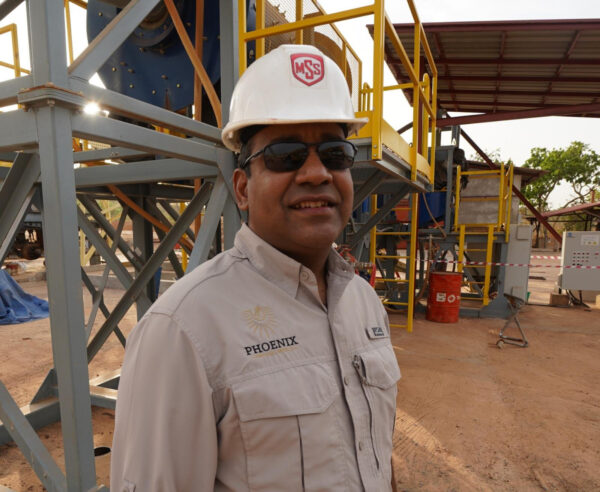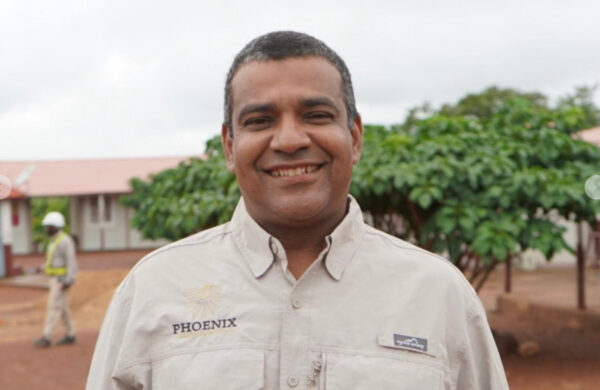In a media landscape where fake news often overshadows the truth, Yacoub Sidya, CEO of MSS Security, Global Aviation, and Phoenix Precious Metals, believes that disinformation is one of the weapons used by hidden lobbies. In this interview, Sidya, who refuses to see himself as a victim, discusses business in general, his entrepreneurial journey, and addresses alleged connections with Russia.
Some newspapers have accused you of having ties with Nordgold, a mining company owned by sanctioned Russian billionaire Alexei Mordashov. What do you have to say about this?
To clarify, I have never denied knowing or working with NordGold. They were my clients, just like any other mining company in West Africa. However, when they were placed on the sanctions list by the USA and the UK, I quickly terminated my contracts in accordance with OFAC General License 37. I was surprised by this unfounded accusation and immediately filed a complaint because I believe in justice. These fake news stories were deliberately spread to hinder a growing business and attract the wrath of the U.S. administration.
The same sources accuse you of connections with the Polisario. What’s your response to that?
I’m not sure if it’s the same source, but the modus operandi is identical. Notably, this source is a previously unknown media outlet with a new website launched in January 2023. Additionally, their social media accounts were created recently, and to add to the mystery, they used fictitious journalist names. Another fabrication. These sources reviewed my client portfolio and noticed one or two Moroccan companies. What easier way to break these contracts than by accusing me of sponsoring a movement I don’t even know? Similarly, I have never laundered gold for former Guinean President Alpha Condé. I am a regional leader in a modest gold convoying activity with contracts, notably with central banks. This was what linked me with the Central Bank of Guinea (BCRG) and, today, with other public entities and numerous mining companies. I hold all the required permits, the most respected international insurances, the technical capabilities, and contracts with major refineries. Our references speak for us.
Has this intense media campaign made you lose clients?
I must say that the press, especially the African press, has a significant role to play in cleaning up the business world. These articles are meant to tarnish my reputation and that of our companies. But only the facts matter. That said, I firmly believe in the importance of a strong, independent, and ethical press. A press that respects these values plays a key role in holding public actors accountable and promoting transparency. However, in the Sahel region, we are witnessing an alarming decline in journalistic integrity. Some media now prioritize financial interests over the truth. While credible sources of information still exist, the proliferation of low-cost digital platforms has facilitated the emergence of fake journalists, leading to a worrying spread of misinformation.
You mentioned being targeted by negative press campaigns. How have these articles affected your business and personal reputation?
No, I didn’t say I was a victim, because I refuse to give my detractors the satisfaction of thinking they have power over me. Negative press campaigns can significantly impact a business in several ways: reputational damage, financial losses, strained relationships with partners, legal risks, and, most importantly, a drop in employee morale. Legally, the risks we face are numerous.
We had to initiate defamation lawsuits against media outlets that spread false information. Additionally, some foreign governments have intensified their bureaucratic procedures, complicating our international activities. These legal challenges pose significant threats, especially when unfounded accusations undermine our credibility.
As for my personal reputation, it remains intact. Those who truly know me understand my values and know what I stand for. That’s what matters to me. If others judge me based on erroneous information without seeking to understand who I really am, that’s their problem, not mine. I will never apologize for my success. I have worked tirelessly every day of my life, from my student years in the United States, and I will continue to fight to the end. This is my identity, and no one can change that.
Is it difficult to counter the false accusations spread by the press?
It is incredibly difficult to face an invisible adversary. What is happening in the Sahel, I call it genuine media terrorism. At first, I chose not to react, convinced that the accusations were so absurd that no one would take them seriously. Unfortunately, I underestimated their impact. Today, I have no choice but to present my side of the story and let everyone judge for themselves where the truth lies.

Have you noticed an improvement or deterioration in journalistic ethics in West Africa in recent years, particularly regarding private companies like yours?
The definition of a “journalist” has evolved significantly over time. Today, many who call themselves journalists create their own versions of facts. The idea that every story has two sides has weakened; instead, the perspective of whoever pays the most often prevails. However, it’s essential to note that this does not apply to all journalists. Many true journalists risk their lives to report the truth, while others misuse their platform to serve personal interests instead of informing the public objectively.
How do you manage your relationships with the press, knowing that you often prefer to stay out of the spotlight?
I have never had a public relations department or consultant, and I still don’t. However, in light of recent attacks from various continents, I am seriously considering forming a team. I want to make it clear that my silence should never be perceived as approval of the false allegations. Regardless, these media outlets will not dictate how I run my businesses or how I live my life. I refuse to grant them that power over me. I remain firmly attached to my principles, no matter the external turmoil.
So, do you think the press should be regulated to reduce the use of media as a tool for defamation?
I am a strong advocate of freedom of expression and a free press. However, it is essential to distinguish between exercising this freedom and personal attacks. The next generation of journalists needs better training, especially on the responsibilities that come with the influence their platform provides. It is also crucial that everyone is held accountable for their actions. Finding a balance between freedom of expression and responsibility is fundamental.
Have these new platforms also contributed to tarnishing your image?
It’s not that I have a major problem with the media; it’s more about a few false pieces of information about me, often spread by less-known or unreliable sources. The real challenge lies in the fact that some people take everything they see online as facts. Social media has amplified these stories, reaching a broader audience, including those who may not have the means to distinguish the truth from falsehoods. This wider dissemination makes managing disinformation more complex, but I remain determined to tell the truth and stay true to myself.
You have taken legal action against several newspapers and online media following the incident of the intercepted plane in Dakar and accusations regarding your ties with Russian mining companies. Do you think these legal actions are effective in protecting your image and countering fake news?
Unlike those who spread disinformation, we trust legal systems, in Africa and elsewhere. That’s why we have chosen to pursue legal avenues to prove our innocence and protect our reputation. We firmly believe that the truth will emerge through these proceedings. We also invite real journalists who want to uncover the truth to come and observe our operations closely. Transparency is paramount.
As an entrepreneur who has weathered many media storms, what advice would you give other business leaders on managing defamation campaigns?
My advice to other business leaders is to stay focused on their work and not be distracted by unfounded attacks. For international companies, I recommend using common sense and asking the question: Who benefits from the defamation? when confronted with negative articles about a service provider. Approach these stories with caution and discernment until you have thoroughly examined them. Remember that the basic principle is the presumption of innocence, not the other way around.
Can the press play a more constructive role in the continent’s economic development?
A robust and independent press could play a crucial role in our continent’s growth. It would be a true pillar of accountability, capable of holding political leaders, government officials, and business executives responsible for their actions.



